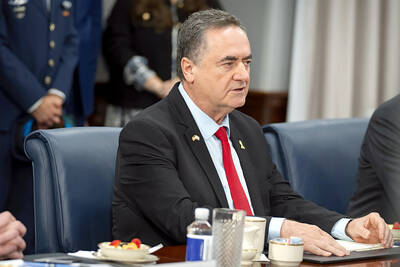Russia yesterday published the files on the 1940 Katyn massacre of Polish officers by the Soviets on the Internet, an unprecedented move aimed at intensifying a sudden thaw in Moscow-Warsaw ties.
The publication, ordered by Russian President Dmitry Medvedev, comes at a time when Russian-Polish ties have been warming in the wake of the plane crash in western Russia earlier this month that killed Polish president Lech Kaczynski.
“On the order of Russian President D.A. Medvedev, electronic copies of authentic archival documents on the ‘Katyn Problem’ from ‘Packet No. 1,’ which were held for decades in the Communist Party archives, have been published on the Web site of the state archives,” it said in a statement.
The documents in question were declassified in September 1992 on the orders of then-president Boris Yeltsin and shared with Poland, so their contents had been long known, the statement said.
However, until now the originals had only been available to specialized researchers and had never before been shared online, a spokeswoman for the Russian state archives said.
One of the documents posted online is a four-page memorandum from Lavrenty Beria, head of the NKVD secret police, to Soviet dictator Joseph Stalin about the fate of thousands of Polish prisoners held by the Soviets.
In the document, Beria proposes that the NKVD “quickly examine the use of the highest means of punishment — death by shooting.”
Stalin’s signature and a red stamp reading “Top Secret” are on the first page of the document, which is dated March 1940.
Poland has long demanded that Russia open all its files on Katyn and the issue has strained ties between the two former Communist neighbors.
The publication of “Packet No. 1” does not have any effect on a separate case in which Russian human rights activists have been waging a court battle to force prosecutors to declassify a 1990s investigation into the Katyn massacre.
Prosecutors closed the investigation in 2004 and have refused to open their files on the case.
Some 22,000 Polish officers were executed by Stalin’s secret police at Katyn, in western Russia, and a number of other places in present-day Russia, Ukraine and Belarus in between April 1940 and May 1940.
The officers were taken prisoner after the Soviet Union invaded and occupied eastern Poland in September 1939, dividing up the country under the terms of a secret pact with Nazi Germany, which seized the rest of Poland.
For decades, Moscow blamed the Katyn massacre on Nazi Germany, until 1990 when Soviet leader Mikhail Gorbachev finally admitted that the Polish officers had been executed as “enemies of Soviet power” by the NKVD.
Meanwhile, Russia’s Federation Council, its upper house of parliament, yesterday ratified a deal with Ukraine that will allow the Russian Black Sea Fleet to stay in Crimea until at least 2042.
Both the Russian lower house, the State Duma, and the Ukrainian parliament, the Verkhovna Rada, had approved the deal on Tuesday, but the Ukrainian ratification was marred by scuffles and smoke bombs among deputies in Kiev.

STEPPING UP: Diminished US polar science presence mean opportunities for the UK and other countries, although China or Russia might also fill that gap, a researcher said The UK’s flagship polar research vessel is to head to Antarctica next week to help advance dozens of climate change-linked science projects, as Western nations spearhead studies there while the US withdraws. The RRS Sir David Attenborough, a state-of-the-art ship named after the renowned British naturalist, would aid research on everything from “hunting underwater tsunamis” to tracking glacier melt and whale populations. Operated by the British Antarctic Survey (BAS), the country’s polar research institute, the 15,000-tonne icebreaker — boasting a helipad, and various laboratories and gadgetry — is pivotal to the UK’s efforts to assess climate change’s impact there. “The saying goes

Police in China detained dozens of pastors of one of its largest underground churches over the weekend, a church spokesperson and relatives said, in the biggest crackdown on Christians since 2018. The detentions, which come amid renewed China-US tensions after Beijing dramatically expanded rare earth export controls last week, drew condemnation from US Secretary of State Marco Rubio, who on Sunday called for the immediate release of the pastors. Pastor Jin Mingri (金明日), founder of Zion Church, an unofficial “house church” not sanctioned by the Chinese government, was detained at his home in the southern city of Beihai on Friday evening, said

TICKING CLOCK: A path to a budget agreement was still possible, the president’s office said, as a debate on reversing an increase of the pension age carries on French President Emmanuel Macron yesterday was racing to find a new prime minister within a two-day deadline after the resignation of outgoing French Prime Minister Sebastien Lecornu tipped the country deeper into political crisis. The presidency late on Wednesday said that Macron would name a new prime minister within 48 hours, indicating that the appointment would come by this evening at the latest. Lecornu told French television in an interview that he expected a new prime minister to be named — rather than early legislative elections or Macron’s resignation — to resolve the crisis. The developments were the latest twists in three tumultuous

FIRST STAGE: Hamas has agreed to release 48 Israeli hostages in exchange for 250 ‘national security prisoners’ as well as 1,700 Gazans, but has resisted calls to disarm Israel plans to destroy what remains of Hamas’ network of tunnels under Gaza, working with US approval after its hostages are freed, it said yesterday. Israeli Minister of Defense Israel Katz said that the operation would be conducted under an “international mechanism” led by the US. “Israel’s great challenge after the hostage release phase will be the destruction of all Hamas terrorist tunnels in Gaza,” Katz said. “I have ordered the army to prepare to carry out this mission,” he added. Hamas operates a network of tunnels under Gaza, allowing its fighters to operate out of sight of Israeli reconnaissance. Some have passed under